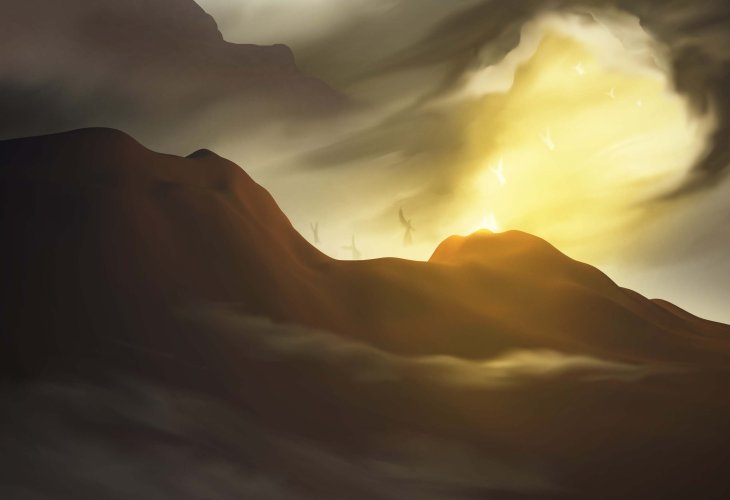Faith
Why Doesn’t God Reveal Himself Again? Free Will and the Golden Calf Lesson
Explore why miracles alone don’t guarantee faith, how free choice shapes belief, and what the sin of the Golden Calf teaches about human responsibility
 (Photo: shutterstock)
(Photo: shutterstock)It was a few decades ago, at a seminar for returnees to Judaism, on a Shabbat afternoon. The lecturer had just finished a two-hour talk, laying out solid evidence and reasoning for the revelation of God to Israel at Mount Sinai. Many listeners were deeply impressed, sitting in awe. Then, a voice rose from the back row:
"Rabbi, if it’s so easy for God to reveal Himself to Israel, why all this fuss? Why do you need to stand here and struggle to bring proofs and arguments? Couldn’t He just reveal Himself again, from time to time, as a refresher? Where is He? Doesn’t He see how many people don’t believe? Why complicate things?"
The man sitting next to him chuckled, and laughter rippled across the hall. It seemed as though this remark had shattered the atmosphere of inspiration the lecture created. Honestly, I felt sorry for the rabbi — he had worked so hard.
The rabbi’s reply surprised everyone. He smiled and said: "Even if God revealed Himself to you personally, it wouldn’t help."
The heckler scoffed again: "Come on, Rabbi, that’s just an excuse. If God revealed Himself to me, I’d follow Him immediately."
The rabbi turned to the crowd and asked: "How many of you prayed Shacharit this morning?" Dozens of hands went up. "And what portion of the Torah did we read today?" He answered: "We read Parshat Ki Tisa, which describes, among other things, the sin of the Golden Calf."
The Golden Calf: Proof of Free Will
The sin of the Golden Calf proves that humans always have free choice. The Israelites didn’t just witness God’s revelation at Sinai. They experienced the splitting of the Red Sea, the ten plagues, and that very morning they had eaten manna to their fill. Yet they put it all aside and danced around a golden calf.
They didn’t deny God outright because they couldn’t, but there is always room for choice. They convinced themselves that if Moshe (Moses) didn’t return, then ‘surely’ God must want them to create a different mediator.
If God were to reveal Himself to us today, we’d be awed, but we’d still retain free will. The revelation would end, and minutes later we’d face moral choices: should I lash out at someone “for the sake of heaven,” or hold back? The test would remain.
Even regarding belief itself, a revelation isn’t a permanent solution. Imagine if God revealed Himself once every hundred years. A few decades later, skeptics would say, “That was for primitive people, before science.” And the cycle would repeat.
Even if one person truly experienced revelation and believed, how would he pass that on to his children? They’d say, “Nice that God revealed Himself to you, but if He wants us to serve Him, He should reveal Himself to us.”
Miracles Don’t Replace Choice
God reveals Himself in many ways even today, and we still sin. Israel experienced open miracles in modern wars, but time after time, we survived, and often prevailed. Did those miracles cause the entire nation to repent? No. Some people recognized God’s hand and changed. Others shrugged and moved on.
Faith always comes down to choice. Those who choose humility and openness to something greater than themselves find faith, while those who choose arrogance, no miracle will convince them.
A Story About Choice
At a social gathering, someone shared this story: A unit of soldiers was sleeping in the desert in their sleeping bags. At dawn, whispers of fear spread. A deadly viper had coiled itself around one soldier’s bag. Its bite would paralyze within minutes, and there was no antidote.
"Don’t move!" his friends whispered. Any movement could trigger the snake. But the snake wasn’t going anywhere.
The commander announced: "Our sniper will try to shoot the snake."
"Are you crazy?" the soldiers protested. "Even the best shot could graze the soldier’s head!"
The commander hesitated — his soldier’s life hung in the balance. Then one of the religious soldiers said: "Wait. Before anything, let’s all say Shema Yisrael together. What do we have to lose?"
"Fine," said the commander.
They all recited Shema aloud. As soon as they finished, the snake raised its head with dignity, uncoiled, and slithered away to its burrow.
The group listened breathlessly. Then someone asked the storyteller: "So, did you become religious because of that miracle?"
"Of course not," he replied. "The snake was on him, not on me."
Even when faith is the most logical conclusion, people still have free will to avoid it.
Why Free Will Matters
God could have created us without free will, and He could have arranged life so that every sin triggered instant punishment. For example, if a person plans to sin, he gets a fever, or if he drives to a forbidden place, his tire blows. However, this would not create a good person, but a robot managed by punishments and rewards. That’s the life of a trained animal, not a human being.
Being human means choosing good even when it isn’t forced. That choice is what defines our spiritual greatness.

